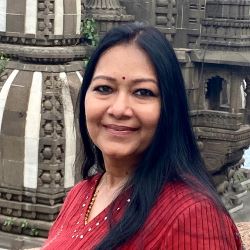
When the deafening alarm bells of our times drown the chirping of birds and abort the whistling of winds, humanity is compelled to count every breath. Fairytales lie buried in the mountains of ash and “the world droops on its own axis”. This anthology presents a chorus of a deeply disturbing lament at the crisis confronted by humanity now cringing with guilt. But then there is hope of redemption reflected in the confessional tenor of the collective poetic utterance. Each poem locates a fresh poetic idiom for the expression of an unprecedented anguish about the degradation of the environment today. In these chiseled and well-sculpted no-nonsense verses, lies the hope for the survival of life. The diagnosis of the malaise could perhaps make the mountains move and churn out some resolution.
Count Every Breath edited by Vinita Agrawal is a collective petition presented by poets in the readers’ court for the protection of the living from extinction.
Sukrita Paul Kumar, Poet, Critic, Academic.
An extraordinary and sensitive anthology of poems that enables us to sense and feel the depth of the ecological crisis. It brings it home, making it urgent, immediate, and human. This timely collection from around the world, spurs us to observe, recognise, and act, in a way only poetry can. Ravi Agarwal, artist, environmentalist

Count Every Breath attempts to document the earth as it is changing before our very eyes. There are stories of extinction and human culpability, of ruins and surviving the apocalypse. A recurring motif within the anthology is that of the human-arboreal relationship, which readers might read as harkening back to the fundamental need for the conservation of trees for the thriving of earth (and us). As we read this anthology in the context of the wider discourse on climate change, let us ask ourselves how ecopoetry might spark in us a subversive “ecstasy [which] is the courage of gardens that endure/ the quiver of time” (“Rewilding”, Medha Singh,Count Every Breath).
Esther Vincent Xueming, author of Red Earth and editor of Making Kin: Ecofeminist Essays from Singapore
As the natural world crumbles and dies around us, these poems bear witness; they care; they pay attention; they grieve. And from the rubble, they salvage startling moments of beauty and grace.” Dr Tom Doig, Lecturer in Creative Writing, the University of Queensland (Australia)
Vinita Agrawal Author of four books of poetry, – Two Full Moons (Bombaykala Books), Words Not Spoken (Brown Critique), The Longest Pleasure (Finishing Line Press) and The Silk Of Hunger (AuthorsPress), Vinita is an award winning poet, editor, translator and curator. Joint Recipient of the Rabindranath Tagore Literary Prize 2018 and winner of the Gayatri GaMarsh Memorial Award for Literary Excellence, USA, 2015. She is Poetry Editor with Usawa Literary Review. Her work has been widely published and anthologised. Her poem won a prize for the Moon Anthology on the Moon by TallGrass Writers Guild, Chicago 2017. More recently her poem won a special mention in the Hawker Prize for best South Asian poetry. She has contributed a monthly column on Asian Poets on the literary blog of the Hamline university, Saint Paul, USA in 2016-17. In September 2020, she edited an anthology on climate change titled Open Your Eyes (pub. Hawakal). She judged the RLFPA poetry contest (International Prize) in 2016 and co judged the Asian Cha’s poetry contest on The Other Side ‘ in 2015. She is on the Advisory Board of the Tagore Literary Prize. She has curated literary events for PEN Mumbai. She can be reached at www.vinitawords.com.

Subscribe to our newsletter To Recieve Updates
Usawa Literary Review © 2018 . All Rights Reserved | Developed By HMI TECH
Join our newsletter to receive updates